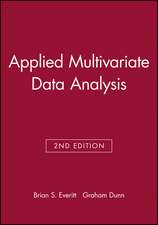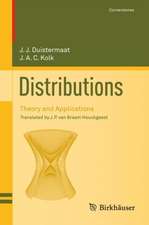Holomorphic Function Theory in Several Variables: An Introduction: Universitext
Autor Christine Laurent-Thiébauten Limba Engleză Paperback – 20 sep 2010
Each chapter begins with a detailed abstract, clearly demonstrating the structure and relations of following chapters. New concepts are clearly defined and theorems and propositions are proved in detail. Historical notes are also provided at the end of each chapter.
Clear and succinct, this book will appeal to post-graduate students, young researchers seeking an introduction to holomorphic function theory in several variables and lecturers seeking a concise book on the subject.
Din seria Universitext
- 13%
 Preț: 353.49 lei
Preț: 353.49 lei -
 Preț: 487.96 lei
Preț: 487.96 lei - 15%
 Preț: 543.75 lei
Preț: 543.75 lei -
 Preț: 418.67 lei
Preț: 418.67 lei - 20%
 Preț: 628.22 lei
Preț: 628.22 lei -
 Preț: 322.62 lei
Preț: 322.62 lei - 17%
 Preț: 364.82 lei
Preț: 364.82 lei -
 Preț: 634.38 lei
Preț: 634.38 lei - 17%
 Preț: 427.32 lei
Preț: 427.32 lei - 13%
 Preț: 355.52 lei
Preț: 355.52 lei - 17%
 Preț: 431.50 lei
Preț: 431.50 lei - 19%
 Preț: 429.21 lei
Preț: 429.21 lei - 19%
 Preț: 393.81 lei
Preț: 393.81 lei -
 Preț: 360.08 lei
Preț: 360.08 lei -
 Preț: 358.44 lei
Preț: 358.44 lei - 13%
 Preț: 389.95 lei
Preț: 389.95 lei -
 Preț: 465.61 lei
Preț: 465.61 lei -
 Preț: 371.99 lei
Preț: 371.99 lei - 15%
 Preț: 497.22 lei
Preț: 497.22 lei - 15%
 Preț: 737.46 lei
Preț: 737.46 lei - 17%
 Preț: 394.41 lei
Preț: 394.41 lei - 15%
 Preț: 509.58 lei
Preț: 509.58 lei - 17%
 Preț: 427.68 lei
Preț: 427.68 lei - 8%
 Preț: 495.44 lei
Preț: 495.44 lei - 17%
 Preț: 364.57 lei
Preț: 364.57 lei - 17%
 Preț: 368.15 lei
Preț: 368.15 lei -
 Preț: 396.55 lei
Preț: 396.55 lei - 15%
 Preț: 553.33 lei
Preț: 553.33 lei - 17%
 Preț: 365.35 lei
Preț: 365.35 lei -
 Preț: 356.78 lei
Preț: 356.78 lei -
 Preț: 673.45 lei
Preț: 673.45 lei - 17%
 Preț: 426.76 lei
Preț: 426.76 lei - 20%
 Preț: 569.56 lei
Preț: 569.56 lei -
 Preț: 372.87 lei
Preț: 372.87 lei -
 Preț: 319.07 lei
Preț: 319.07 lei -
 Preț: 379.86 lei
Preț: 379.86 lei -
 Preț: 445.88 lei
Preț: 445.88 lei -
 Preț: 382.36 lei
Preț: 382.36 lei - 15%
 Preț: 533.72 lei
Preț: 533.72 lei - 15%
 Preț: 496.02 lei
Preț: 496.02 lei - 15%
 Preț: 474.82 lei
Preț: 474.82 lei -
 Preț: 389.70 lei
Preț: 389.70 lei -
 Preț: 484.08 lei
Preț: 484.08 lei - 15%
 Preț: 643.48 lei
Preț: 643.48 lei -
 Preț: 415.02 lei
Preț: 415.02 lei - 15%
 Preț: 602.25 lei
Preț: 602.25 lei - 20%
 Preț: 510.24 lei
Preț: 510.24 lei - 15%
 Preț: 588.37 lei
Preț: 588.37 lei -
 Preț: 381.59 lei
Preț: 381.59 lei
Preț: 453.01 lei
Nou
Puncte Express: 680
Preț estimativ în valută:
86.69€ • 92.69$ • 72.27£
86.69€ • 92.69$ • 72.27£
Carte tipărită la comandă
Livrare economică 18 aprilie-02 mai
Preluare comenzi: 021 569.72.76
Specificații
ISBN-13: 9780857290298
ISBN-10: 0857290290
Pagini: 252
Ilustrații: XIII, 252 p.
Dimensiuni: 155 x 235 x 14 mm
Greutate: 0.38 kg
Ediția:2011
Editura: SPRINGER LONDON
Colecția Springer
Seria Universitext
Locul publicării:London, United Kingdom
ISBN-10: 0857290290
Pagini: 252
Ilustrații: XIII, 252 p.
Dimensiuni: 155 x 235 x 14 mm
Greutate: 0.38 kg
Ediția:2011
Editura: SPRINGER LONDON
Colecția Springer
Seria Universitext
Locul publicării:London, United Kingdom
Public țintă
GraduateCuprins
Elementary local properties of holomorphic functions of several complex variables.- Currents and complex structures.- The Bochner-Martinelli-Koppelman kernel and formula applications.- Extensions of CR functions.- Extensions of holomorphic and CR functions on manifolds.- Domains of holomorphy and pseudoconvexity.- The Levi problem and the resolution of in strictly pseudoconvex domains.- Characterisation of removable singularities of CR functions on a strictly pseudoconvex boundary.- Appendices.
Recenzii
From the reviews:
“This introduction to complex analysis in several variables uses integral representation theory together with Grauert’s bumping method to characterize domains of holomorphy, in other words to solve the Levi problem. … Each part is provided with a detailed abstract and interesting historical notes. This concise and self-contained book is a welcome enrichment to the existing literature for both graduate students as well as researchers.” (F. Haslinger, Monatshefte für Mathematik, Vol. 165 (1), January, 2012)
“This introduction to complex analysis in several variables uses integral representation theory together with Grauert’s bumping method to characterize domains of holomorphy, in other words to solve the Levi problem. … Each part is provided with a detailed abstract and interesting historical notes. This concise and self-contained book is a welcome enrichment to the existing literature for both graduate students as well as researchers.” (F. Haslinger, Monatshefte für Mathematik, Vol. 165 (1), January, 2012)
Textul de pe ultima copertă
This book provides an introduction to complex analysis in several variables. The viewpoint of integral representation theory together with Grauert's bumping method offers a natural extension of single variable techniques to several variables analysis and leads rapidly to important global results. Applications focus on global extension problems for CR functions, such as the Hartogs-Bochner phenomenon and removable singularities for CR functions. Three appendices on differential manifolds, sheaf theory and functional analysis make the book self-contained.
Each chapter begins with a detailed abstract, clearly demonstrating the structure and relations of following chapters. New concepts are clearly defined and theorems and propositions are proved in detail. Historical notes are also provided at the end of each chapter.
Clear and succinct, this book will appeal to post-graduate students, young researchers seeking an introduction to holomorphic function theory in several variables and lecturers seeking a concise book on the subject.
Each chapter begins with a detailed abstract, clearly demonstrating the structure and relations of following chapters. New concepts are clearly defined and theorems and propositions are proved in detail. Historical notes are also provided at the end of each chapter.
Clear and succinct, this book will appeal to post-graduate students, young researchers seeking an introduction to holomorphic function theory in several variables and lecturers seeking a concise book on the subject.
Caracteristici
Provides a careful introduction to complex analysis in several variables Each chapter begins with a detailed abstract, clearly demonstrating its organization and relations with the following chapters New concepts are clearly defined and theorems and propositions are proved in detail Historical notes are provided at the end of each chapter Includes supplementary material: sn.pub/extras














